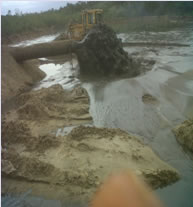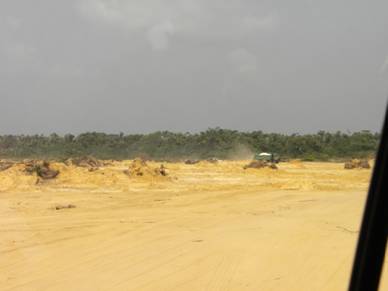
The situation of dredging and sand supply in Lagos is yet to clear up due to the secret involvement of state government officials in the business itself. As at mid-February the Ministry of Waterfront Infrastructure Development which has hijacked much of the administration of dredging in the state drew up a list of 15 dredging companies which were being touted as the only candidates that will be allowed to engage in sand winning from the rivers and water bodies in the state. This list was widely suspected to be largely fronts, except for the very big actors like Julius Berger. But no sooner had the meeting started holding than it was stopped again due to what some insiders informed DDH was a wave of indecision and uncertainty that continues to befuddle Lagos state’s attempt to wrest from the federal government an administrative schedule that the federal constitution put squarely in the exclusive preserve of the federal government. This fact is said to be a continuing worry for those in the state government who feel that dredging and sand mining business in Lagos should be cornered and shared out mainly to state indigenes.
DDH was informed that the list was made up of some of the big dredging firms, local and foreign and a smattering of some startups which are mainly fronts for conniving government officials.
But the NIWA has regrouped and, according to some sources, plans to support the business of those it has licensed for sand winning in the state. NIWA has instructed these ones to be courageous enough to deploy their dredgers to their allocated sites though there is some hesitation on the part of many dredge owners in view of last year’s harassment when officials of Lagos state from the Waterfront Ministry depleted the gains of many operators and destroyed some of their equipment. Therefore the situation with dredging in the state is still fluid.
The only two well-known sand dredging operations in the state are happening in Aja as at press time. In mid-March, the big dredger brought in by Sedac Investment began pumping sand for reclamation in Aja. Two top officials, one from each of the state’s Waterfront Ministry and its Environment Ministry are said to be partners in that Sedac dredging venture. The others are said to be two other indigenes of the state, one of them a traditional ruler in the area. In the other case, also at Aja, Julius Berger (JBN), which is constructing the new Lagos-Badagry Expressway is said to have gotten a deal with the Lagos State government to mine sand from the Lagos lagoon at Aja. This special situation is confirmed because all the sand is being ferried in JBN trucks from Palavar Yard Aja to the construction site around Orile Iganmu and environs more than sixty kilometres away.
Otherwise, sand mining from the rivers and streams of Lagos State is still a no-go area due to underhand dealings by officials of the state and indecision of the state government about when and how to liberalize the dredging playing field.
Surface Mining and Artisanal dredging to the rescue…
Meanwhile the upsurge of surface mining and artisanal sand winning continue now on a larger scale as the only sources of sharp river sand and its variants. In the apparent scarcity of river sharp sand all over the state, builders and road construction companies now patronize artisanal sand miners and surface sand miners respectively. The artisanal sand miners who were being battled to submission about two years ago now have a field day and can be seen doing prosperous business at places like Ikorodu, Tin Can Island Port, Coconut Underbridge and many other similar places where the locals use large canoes to ferry sand scooped from mid-stream and sell to customers along the roadsides. But a lot of their sand is dark-coloured and not whitish.
Surface sand miners, on the other hand, produce red earth (sand) and though this variety had not been in much use in Lagos before now for major projects but due to the lingering face-off between Lagos state government, the federal government and dredging contractors, the sand supply market has no choice but use it. In fact, some big projects like the Lagos-Epe expressway reconstruction project is relying solely on surface-mined red earth, from close observation.
Overall, many stakeholders bemoan the emergent index in the permutations for sand supply in Lagos state presently: the involvement of state government officials in all the aspects of the business. An official of the Federal Ministry of Mines and Steel Development (MMSD) who would not want his name in print, told DDH that the mining of surface earth (sand) falls under its jurisdiction and they (MMSD) have been licensing surface miners in the state. But, according to him, the Lagos State government officials from various ministries usually disturb the licensees to the extent that only few of them can openly work in their licensed locations. He said even those few who were allowed to work were subjected to various terms and conditions including underhand payments of bribe charged by the officials to allow them to work in peace. According to him, when officials of MMSD confront the state government officials about this interference they would explain it away as either routine checks on the operations of the surface miners or to ascertain the identity of the proprietors and the owners of the land.
Other reasons he said they would adduce for interfering include concern about the forest or to verify environmental impact assessment (EIA) reports, some of which he said they reject, despite the fact that all the EIA reports would have been produced by EIA-firms accredited by the state government. He also revealed that part of their quarrel with the state government included the fact that the same surface miners who were being restrained from operating were, before now, being taxed by the state government using so-called tax consultants who stationed agents at their sites for the purpose of reckoning sand quantities produced and sold. The MMSD official regretted the double standards and outright disobedience to court orders by the state government. The court orders were injunctions against Lagos state government from interfering with the activities of some sand miners.
CLAMP-DOWN ON SURFACE MINERS- HOW SUCCESFUL?
By Nehemiah Chinedu.

The business of sand dredging and sand filling may have finally hit the bus-stop following the total ban of such operation by the Lagos state government. It is on record that the Fashola administration has denied operating permits to most operators in the sand business in Lagos state. The reason offered for these withdrawals is that sand mining/ dredging expedite the submersion of Lagos state. In fact one individual in the sand dredging business alleged that the state government claimed that their activity poses a great threat to the Third Mainland Bridge, for example.
Therefore, the hitherto thriving sand mining business some one/two years ago is now on the wane. Some truck drivers are already counting their losses as their vehicles park all day long having no load to carry while a few of their lucky fellows can be seen speeding the Epe expressway between mining and project sites.
This state of affairs has also slowed down activity in Lagos and especially Lekki area, where land reclamation, sand filling and massive building projects used to hold sway. A visit to some dredging sites along Lekki-Epe area of Lagos shows that these sites are a shadow of their former selves as there were no visible signs of activity going on.
But it should be stated here that the surface miners of sand are taking a heavy toll on the ecosystem in their areas of operation. The decimation of trees and shrubs is palpable. There appears to be little or no mitigation measures by these operators after scooping the red earth. Most sites visited have no forest cover; only large holes in the ground bereft of all life.
DDH found only one former site of surface mining that is being to put to some use. This is at Lakwe. It is now being developed into an estate, as stately buildings can be seen erected in some portions of the former site.
The situation of sand business in Lagos is so hazy that though the state government has outlawed dredging of sand, those in the business of sand have to survive, along with their dependent family. To this end, secret sand mining activity cannot be completely ruled out. In fact, in one of the sites visited, DDH gathered that the miners, these days, operate at irregular and unpredictable intervals. This is aimed at evading the state government agents who maintain patrols of mining sites. According to sources, night operations by operators also take place. In one construction site, the contractor hired a truck driver who only accepted to supply sand at night. Indeed, he confided in DDH that he supplied about eight trips of sand on the previous night.
On their modus operandi, it was gathered that miners usually buy new surface mining sites and excavate the sand as quickly as possible before the authority gets to know about it. As at press time, some sites Bogije were being harnessed in this manner. From observations, only companies working with the state government were being given free hand to source their sand needs.
Consequently, the scarcity of sand has skyrocketed prices of various types of construction sands. One of the dealers said his plaster sand goes for between N 35,000 and N40,000 for a 20 tons truck. Sharp sand costs between N55,000 and N60,000 for 20 tons.
Artisanal sand miners who operate with canoes are having a field day. They hardly produce enough sand to service the high demand for sharp sand in the market. The government, after some weak noises about curbing their activities, appears to be either looking the other way or simply not worried since the artisans are indigenes.
In the mean time, most of the former sand businessmen who used dredgers for sand miners appeared to relocated to other coastal states like Ogun Rivers, Bayelsa or Cross River.
